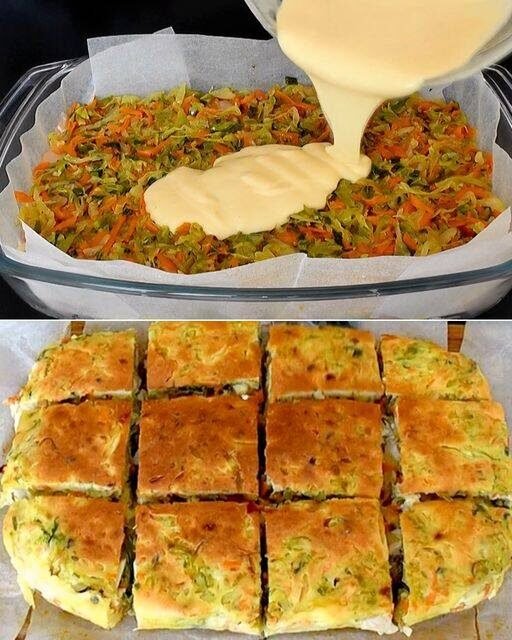Ingredients:
For the Filling:
- 1 small green cabbage, finely shredded
- 1 can (15 oz) chickpeas, drained and rinsed
- 1 large onion, finely chopped
- 2 cloves garlic, minced
- 1 carrot, grated
- 1 celery stalk, finely chopped
- 1 tablespoon olive oil
- 1 teaspoon ground cumin
- 1 teaspoon ground coriander
- 1/2 teaspoon smoked paprika
- Salt and pepper to taste
- 1 cup vegetable broth
For the Pie Crust:
- 1 1/2 cups all-purpose flour (or whole wheat flour for a healthier option)
- 1/2 cup vegan margarine or coconut oil, cold and cubed
- A pinch of salt
- 4-5 tablespoons ice-cold water
Nutrition Facts (Approximate values per serving – Makes 6 servings):
- Calories: 350
- Total Fat: 15g
- Total Carbohydrates: 44g
- Dietary Fiber: 8g
- Protein: 10g
Servings:
This recipe makes approximately 6 servings.
Instructions:
1. Prepare the Pie Crust:
- In a large mixing bowl, combine the flour and a pinch of salt.
- Add the cold, cubed vegan margarine or coconut oil to the flour. Use a pastry cutter or your hands to combine the fat and flour until it resembles coarse crumbs.
- Gradually add the ice-cold water, one tablespoon at a time, and mix until the dough comes together. Form the dough into a ball, wrap it in plastic wrap, and refrigerate for 30 minutes.
2. Prepare the Filling:
- In a large skillet, heat the olive oil over medium heat. Add the chopped onions and garlic and sauté until they become translucent.
- Add the grated carrot and chopped celery, and cook for another 3-4 minutes.
- Stir in the shredded cabbage and cook until it wilts down, approximately 10 minutes.
- Add the chickpeas and spices (cumin, coriander, smoked paprika), and season with salt and pepper. Cook for an additional 5 minutes.
- Pour in the vegetable broth and allow the mixture to simmer for 10-15 minutes, or until the cabbage is tender.
3. Assemble the Pie:
- Preheat your oven to 375°F (190°C).
- Divide the pie crust dough in half. Roll out one half on a floured surface to fit the bottom of a pie dish.
- Transfer the cabbage and chickpea filling into the pie crust.
- Roll out the remaining dough to create the pie’s top crust. Place it over the filling and crimp the edges to seal the pie.
- Cut a few slits in the top crust to allow steam to escape during baking.
4. Bake:
- Place the pie in the preheated oven and bake for 30-35 minutes or until the crust is golden brown and the filling is hot and bubbly.
5. Serve:
- Allow the Vegan Cabbage and Chickpea Pie to cool slightly before serving. Slice and enjoy!
Gut Health:
Plant-based diets are often associated with improved gut health due to the high fiber content from fruits, vegetables, and whole grains. A healthy gut microbiome is linked to better digestion and overall well-being.
Anti-Inflammatory Properties:
Many plant-based foods have anti-inflammatory properties, which can help in reducing inflammation in the body. Chronic inflammation is associated with various health issues, and a vegan diet may contribute to its prevention.
Sports Performance:
Contrary to the misconception that vegan diets lack protein, many successful athletes follow plant-based diets to enhance their performance. Plant-based proteins can support muscle building and recovery.
Reduced Risk of Foodborne Illnesses:
Plant-based diets eliminate the risk of foodborne illnesses associated with the consumption of undercooked or contaminated animal products.
Economic Impact:
A vegan diet can be more economical as plant-based protein sources tend to be cost-effective compared to some animal products. It may be a budget-friendly option for individuals or families.
Mindful Eating:
Adopting a vegan lifestyle often promotes mindful eating. Being more conscious of food choices and sources can lead to a healthier relationship with food and a greater appreciation for the environmental impact of dietary decisions.
Preservation of Biodiversity:
The expansion of animal agriculture often leads to habitat destruction and loss of biodiversity. Choosing a vegan diet supports the preservation of ecosystems and the protection of various species.
Culinary Diversity:
Veganism introduces individuals to a diverse range of cuisines and ingredients from around the world. Exploring plant-based cooking can be a culinary adventure, embracing flavors and techniques from different cultures.
Reduced Antibiotic Resistance:
The use of antibiotics in animal farming contributes to the rise of antibiotic-resistant bacteria. Opting for a vegan diet can be a way to reduce the demand for such practices and promote responsible antibiotic use.
Cruelty-Free Beauty and Personal Care:
Veganism extends to beauty and personal care products. Choosing cruelty-free, vegan alternatives ensures that your lifestyle aligns with ethical choices beyond just dietary preferences.
